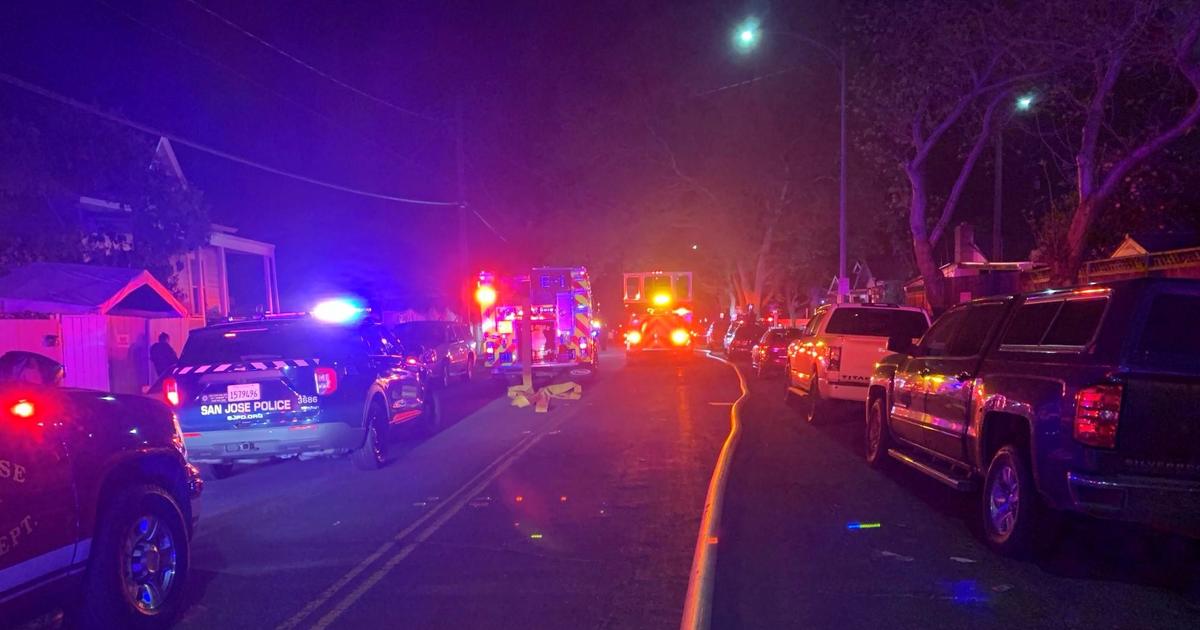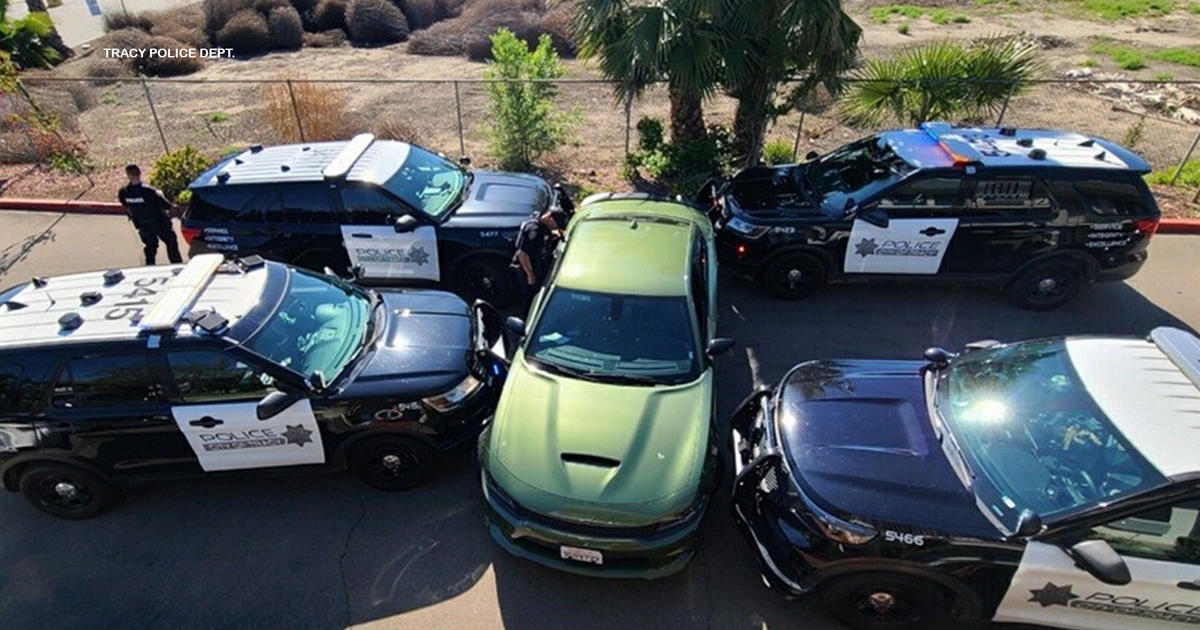Federal Judge Bars Sausalito From Clearing Homeless Encampment In Dunphy Park
SAUSALITO (BCN/CBS SF) -- Two parks, alike in dignity, lay in fair Sausalito.
The first, Dunphy Park, houses a homeless encampment with no showers and only a single shared toilet; the other, Marinship Park, has permanent bathrooms and was alleged to be suitable for a mobile showering program.
The city of Sausalito proposed to move the encampment from Dunphy to Marinship out of alleged concern for health and safety.
Sausalito's chapter of the California Homeless Union, along with a number of the homeless campers, challenged the forced relocation, and a federal judge was called to decide.
On Monday, U.S. District Judge Edward Chen blocked the city from breaking up the Dunphy Park encampment. His order allows the approximately 20 unhoused individuals staying there to continue in their makeshift camp until a full trial of the dispute can be held.
Dunphy Park contains 160,000 square feet of recreational space adjoining Richardson Bay. The encampment is located primarily on Humboldt Avenue, east of the park, just north of 300 Locust St., according to the court.
Marinship Park is located about a half-mile away, close to the water but not on the shoreline.
The dispute arose from a set of resolutions adopted by Sausalito's City Council after a special session on Feb. 5.
In the first resolution, the Council reviewed Sausalito's history of supporting homeless individuals and affirmed "its commitment to continue to work with its regional and local partners to explore every opportunity to provide shelter and care to those without a home and to treat all individuals experiencing homelessness with compassion and dignity."
The second resolution dealt with the encampment at Dunphy Park by closing that park to camping, stating that the "encampment is not an appropriate location because of its proximity to Richardson Bay and... lack of access to restrooms, showers and other sanitary services and thus poses health, welfare and safety risks to the persons living in the encampment and to the environment."
The second resolution goes on to say that Marinship Park, located at Testa Street at Marinship Way, is "a more appropriate publically-owned location within the City for overnight sleeping by people without homes who have no option to sleep indoors, due to its access to restrooms, mobile showers, sanitary services, trash collection, and other factors."
That resolution not only closed Dunphy Park to camping at all times, it also closed all city-controlled land -- including streets and parks -- to camping during the day. The upshot was that Dunphy was completely closed to camping, and at Marinship Park, camping was permitted only at night.
The ban on daytime camping meant that a camper at Marinship Park would need to break camp and remove his or her tent, camping gear and personal possessions by 30 minutes after sunrise and couldn't camp again until 30 minutes before sunset. At the time of the hearing, sunrise was 7:08 a.m. and sunset at 5:39 p.m., so a camper would be without a campsite for roughly ten hours.
In 2019, the 9th Circuit Court of Appeals ruled in Martin v. City of Boise that "as long as there is no option of sleeping indoors, the government cannot criminalize indigent, homeless people for sleeping outdoors, on public property, on the false premise they had a choice in the matter."
In its opposition to the injunction, the city sought to avoid the Martin ruling by focusing on the fact that the Marinship Park site was more suitable for camping, largely because there were no nearby bathrooms at Dunphy Park, whereas "Marinship Park contains permanent bathroom facilities in close proximity to the replacement site consisting of two toilets in the women's restroom, and one toilet and one urinal in the men's restroom...The Marinship restroom is also open 24 hours a day seven days a week."
In addition, Marinship Park was a more suitable location for the city to provide its existing mobile showering service. Allegedly, the Dunphy facilities would not support that service. The city touted the fact that "Beneficiaries of the program took 2,342 showers between the start of the program in November 2018 through October 27, 2020 and a whopping 1,271 showers were provided in Sausalito during 2020 alone (through October 27, 2020)."
In sum, the city argued that the decision to close Dunphy was justified by the fact that Marinship Park was safer than Dunphy from a health perspective.
When the plaintiffs brought their suit, the case was originally assigned to U.S. Magistrate Judge Laurel Beeler, but under usual practice, the parties were asked if they consented to all proceedings in the matter being resolved by a magistrate judge, rather than a District Court judge.
The city, by its counsel, declined to consent, and Judge Chen was subsequently assigned the case.
He did not accept the city's argument.
Before ruling, he paid a visit to the Dunphy campsite to observe for himself. Federal judges are allowed to visit the site of a dispute under certain circumstances, though it is relatively uncommon.
Chen began his analysis by noting that Sausalito's second resolution had two distinct parts. First, it closed Dunphy and made Marinship available in its place. But, in his mind, the second part of the policy, which closed the city, in general, and Marinship Park, in particular, to daytime camping, was the more important.
Analyzing the daytime camping ban, the judge noted that by requiring the campers to break camp every morning, campers would be likely to disperse through the city for hours until they were allowed to return and reassemble their camp site.
This posed a variety of dangers during an active pandemic.
Dispersing campers would risk increasing their exposure from each other as they worked together to break down the common areas of the campsite, like the communal kitchen. They would also risk exposure from residents of Sausalito who they would see during the day.
Conversely, residents of Sausalito would face the possibility of exposure from the campers as they moved around during the day.
The judge noted that the U.S. Centers for Disease Control and Prevention "has given guidance indicating that encampments should not be broken down during the pandemic precisely because such is likely to lead to dispersal which, in turn, heightens the risk that the disease will spread."
He quoted CDC guidance that " 1/8i 3/8f individual housing options are not available, allow people who are living unsheltered or in encampments to remain where they are."
The judge found it significant that the "Defendants have offered no good reason that justifies the ban on day camping. Defendants have not explained why they have chosen to take action that flies in the face of CDC guidance."
He concluded that "The facts, as presented thus far, strongly suggest that Defendants, in enacting this ban, have done so in spite of, not in furtherance of, public health. There is a strong argument that Defendants have acted in reckless disregard for the campers' health and safety."
Because he found that ban on daytime camping decreased public health and safety, he concluded that plaintiffs had shown a sufficient likelihood of success to justify a preliminary injunction.
On the other part of the resolution -- the forced move to Marinship Park -- the judge found that the plaintiffs were on shakier ground. However, he noted that the plaintiffs had provided evidence that Marinship Park adjoined a "boat crushing operation" run by the U.S. Army Corp of Engineers. The plaintiffs alleged that they would be "exposed to clouds of lead based paint dust and fiberglass resulting from the daily boat crushing operations 1/8there 3/8."
While the judge found the evidence on this contention "thin," it was sufficient, when taken together with the ban on daytime camping, to justify injunctive relief.
In entering the injunction, the judge emphasized that it could be revisited. The daytime camping ban might need to be reassessed if the COVID-19 situation were to change in the future because, "The calculation of safety risks and the balance of hardships could change if the pandemic recedes."
He also said that the defendants were free to move to dissolve the injunction against moving the encampment to Marinship Park if, for example, the defendants were to "demonstrate there are no toxic risks at the proposed encampment site at Marinship Park and that the move can be safely accomplished."



